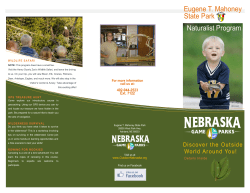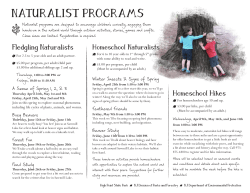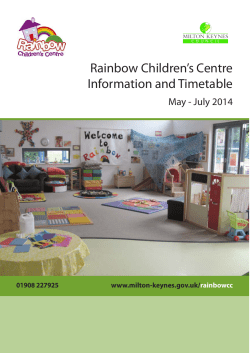
Junior Naturalist Program Parent Handbook 2014 Family Nature Summit
Junior Naturalist Program Parent Handbook Asilomar State Park Photo Credit: Bob Turner 2014 Family Nature Summit Asilomar State Park and Conference Center Pacific Grove, California June 28 – July 4, 2014 Welcome! Welcome to the 2014 Family Nature Summit. We are appreciative and proud of the efforts of the individuals who put in countless hours to make it possible to carry on the tradition of Family Summits. Here families can enjoy outdoor experiences led by national experts. Together and in age-appropriate group programs, like our Jr. Naturalist program, we strive to build once-in-a-lifetime family opportunities. We are so happy to be working with your child in the Jr. Naturalist Program. We have a lot of fascinating, exciting, and FUN things planned for the Junior Naturalists this June 28-July 4. We look forward to sharing our love of nature with your child. Jr. Naturalist Director: Steve Houser, Jr. shouserjr@carolina.rr.com 704-843-3979 Goals of the Junior Naturalist Program Environmental Education To awaken and stimulate a curiosity about nature To encourage and instill an appreciation for nature To suggest proper stewardship of our earth To develop a connection with nature To take action and use what has been learned at the Family Summit throughout the year To inspire our next generation to be good stewards of the earth Adventure To learn the ecology, geography, history, and culture of a new environment through hands-on exploration Character Building To learn what each of us can do to help our environment To respect the world around us To be responsible in doing our part to improve the quality of nature Jr. Naturalist Pledge: As Jr. Naturalists, we strive to: Learn more about the wonders of nature Explore with care and purpose Improve our world where we can Respect the importance of every living thing Do our best in whatever we do Help others to be their best Program Management Our program’s management is provided by the Junior Naturalist Program Director, Steve Houser, Jr. Steve has been involved in the Summit’s Jr. Naturalist Program for 28 Summits. He is a national and state award winning elementary school educator who uses the natural world as a gateway in teaching lessons in all curricular areas. Naturally, Steve loves sharing the wonders of nature with children. Program Staff All of our Junior Naturalist Program leaders have experience working with children in the outdoors. Some are classroom teachers. Others are naturalists at nature centers or parks. Some have experience as camp counselors or in other youth programs as well. Many have Bachelors’ or Masters’ Degrees in environmental education or science. Our Jr. Naturalist Groups We group the children based on their school grade. All of our groups are multiaged, and attention is focused on age appropriate activities that challenge and stimulate all of the children. The youngest group, the Hermit Crabs, contains children who are in kindergarten to those who have completed kindergarten. The next group the Sea Otters, are children who have completed the first and also those who have completed the second grade. Our third group is the Redwood Trees. These children have completed third through fourth grades. Our oldest group, the Naturalists, consists of children who have completed grades five through six. Group Programs Each group’s program is designed by the youth group leaders to fit the interests and abilities of that age group. We will be physically active all week. While we always have nature studies, games, and challenging activities such as crafts and hikes, the activities vary depending upon the skill levels of the age group. Your child may also enjoy journaling and classes such as: outdoor safety, nature drawing, habitat exploration, and aquatic studies. Minor adjustments may be made to the schedules due to last minute cancellations and changes. You will receive a new schedule at Registration (Saturday). See your child’s Junior Naturalist Program Schedule for more information. Buddy Requests We take all buddy requests into consideration when forming groups. It is more difficult to move children from one group to another as we get closer to the Summit since group leaders will have bought supplies and prepared activities for a specific number of children in their group. If buddies are grouped together, they are usually placed in the group of the younger of the two buddies. Please do not assume that just because your child was with another child last year that he/she will be placed in the same group again this year. Also, we usually do not honor a request for a buddy with more than one year or grade level difference from your child. We have a program that is increasingly more physically challenging with each older group. A younger child may not be able to keep up with the older children in a group, and an older child placed in a younger group will quickly become bored. Alternate Activities We do not provide alternate activities. If your child does not want to participate in the programs and activities scheduled for his or her group for a day or part of a day, you will need to make other plans for your child. Please let your child’s group leader know of your plans. If you are not able to keep your child with you or another adult member of your group, please use the childcare that is offered (see “Childcare”). Children should not be left alone in their rooms, at the pool, or elsewhere on the grounds. “Leave only footprints.Take only pictures.” Photo of Point Lobos State Park by Summiteer Ralph Locher of California Opening day Registration at the Summit takes place on Saturday between 1:00 – 5:30 p.m. Parents may pay additional activity fees at the Summit registration desk at this time. I sent a previous email that outlined activities that will incur extra fees. After going to the general registration desk, you will need to register your child at the JNP registration desk., which will be near the Summit registration desk. Also, there will be a brief orientation for all JNP families on Saturday evening from 6:45-7:15, followed by the Family Nature Summit opening program at 7:30. JNP group leaders will be present at the orientation meeting to meet with parents and children in their groups and to answer any specific questions you may have about the program and the week's activities. If you missed checking in with us at registration, please talk to us personally after our Jr. Naturalist Parent Meeting. Daily Schedule: Sunday thru Thursday Start time: 8:15 a.m. Please be at our meeting place on TIME!! Morning Session 8:15-12:15 Lunch with parents 12:15-1:15 Afternoon Session 1:15-3:45 p.m. Ending Time: 3:45 MEETING TIMES & PLACES WE will have a designated place for all of the JNP youth to be dropped off and picked up. This will be identified at the Jr. Naturalist registration. 8:15 a.m. - Drop off child and check in with JNP leaders. *12:15 p.m. – Sign out your child and bring him/her to lunch (unless child has sack lunch with his/her group that day or you have signed the waiver for the child to leave on his/her own.) IF LATE, we will bring your child to the childcare area of the lunchroom. 1:15 p.m. – bring child back to group after lunch. *3:45 p.m. – End of program session. Sign out your child (unless you have signed a waiver for your child to leave on his/her own.) * LATE?? If you are late in picking up your child, he/she will be delivered to Childcare, and you will be charged $5.00 per hour. At lunch, the child will be delivered to the Childcare table in the lunchroom. At the end of the day, the child will be delivered to the Childcare room. What to Bring – Labeling your child’s items is a GREAT idea!! Also, plan to dress in layers as the days are pleasant (70’s F) and the nights can be cool (50’s F) Sweater/sweatshirt One pair sturdy hiking shoes or boots Extra pair old or cheap shoes (that can get wet or muddy) Jacket Pants and shorts T-shirts Extra socks Rain gear Water bottle(32 ounces)—In higher elevations it is especially important for your child to drink a lot of water. Sunscreen Insect repellent Hat/visor (to keep the sun off your face) Sunglasses Small backpack (for housing the above items each day) Optional Items to Bring Snacks (healthy, non-perishable) Extra water bottle Sunglasses Camera (disposable is best- label name on is since many look alike) Small binoculars Lip protection Sports equipment/cards/board games (Frisbee, for free time after the program) What to Leave Back at Your Room Please leave any electronic games, Pods, cell phones, pocket knives, matches, special toys, or any other unnecessary things in your room. These things usually divert the child’s attention from the group’s activities and can be distracting or dangerous to other children. Snacks Children are allowed to carry snacks in their packs. If you give your child a snack, please make sure that your child does not bring any junk food, soda, gum or candy. We do not have refrigerators or coolers during the day so do not pack any perishable food. Childcare If you are going to be on an all-afternoon field trip to last after 3:45 p.m., Childcare will provide supervision for your child from 3:45 - 5:45 p.m. Childcare can also watch your child during lunch if you will be on a field trip. You must make arrangements with the Childcare staff for this service 24 hours in advance. You can do that at the Childcare registration desk on opening day or at the Childcare table in the dining room at breakfast each day. The cost is $5.00 per child per hour. Any children not picked up by 12:15 p.m. or by 3:45 p.m. each day will be turned over to Childcare, and the parents will be billed for the service. Sharing Time with Your Child Sometimes parents would like to excuse their children from the Junior Naturalist Program for a full or half day in order to spend the day together. If you plan to do this, please let your child’s group leaders know in advance. Adults are always welcome to accompany their child’s group for a day or a few hours. If you would like to do this, please coordinate with your child’s group leaders in case they need to include you in the count for a bus seat or boxed lunch. In some cases, there may not be transportation available for an additional person to accompany your child’s group, and we ask for your understanding should that happen. Afternoon and Evening Events Remember to check the schedule for opportunities for families to explore and learn together. We have many sessions that start at 4:00 and after dinner. We encourage you to enjoy time as a family at these events. Adult Supervision/Special Needs We follow and often exceed the American Camping Association’s recommended ratios for adult supervision for day camp programs. Our adult-to-child ratios are: Age 5 1:6 Ages 6-8 1:8 Ages 9-13 1:10 If your child needs one-on-one attention, please do not enroll him or her in our program. We do not have the adult staffing required for that level of attention. While all of our youth group leaders have experience working with children in the outdoors, they may not be trained to work with children having special needs. If you have a special needs child, please let your child’s youth group leaders know well in advance what activities your child can handle at the same level as his/her age group and what activities your child may need special help to participate in them. While we will try to accommodate each child’s needs, we do not want to alter the experience for the rest of the children in a group to meet the needs of one child. We will work with parents to find the best reasonable solution for their child. Behavior Expectations In order to have a great experience, we expect the children in our program to follow some basic behavior rules: Stay with your group ALWAYS. (We also use the buddy system.) Be respectful of others--adults, other children, yourself. Keep your hands to yourself. Don’t touch other people’s things or other people. Come prepared for the day’s adventure with the appropriate clothing and equipment. (Sunscreen & bug spray should be applied in advance.) Look after yourself. Pick up your own things and put trash away properly. Be willing to experience new things –new activities, new places, and new foods. DON’T feed the animals. (In many places, feeding wildlife is illegal, and it is always WRONG.) One question that is frequently asked is how we handle children who may be “acting up” during the day. Our staff will try to redirect the child’s attention and engage him/her in the group’s activities. If someone is not cooperative and is disrupting the group or poses a safety threat to other members of the group, he or she will be removed from the group and not allowed to return for the rest of the day. After returning to the group the next day, if the child continues to be disruptive or poses a safety threat, he or she will be removed from the group for the rest of the week. If a child is removed from a group, we will attempt to locate the parents to place the child with them. If the parents are on a field trip, the child will be taken to Childcare or the Summit office. Examples of behavior that is “acting out” -disruptive or poses a threat of harm to others are: Angry or vulgar language, including swearing, name calling, and shouting. Poses a safety threat to him/herself or others Physical contact with another person in any angry or threatening way (such as pushing, shoving, hitting or biting) Harassment or intimidation by words, gestures, body language or any other menacing behavior Disrespectful “talking back” to the youth group leaders, other adults or other children Theft or destruction of another’s property If you know that your child has difficulty in the classroom or daycare setting, please let us know confidentially what problems or behaviors your child experiences and how you recommend handling these situations when they arise. Please do not hesitate to contact a staff member if you or your child experiences any behavior from another child or adult that is not in keeping with our behavior policy. We will investigate all complaints. We want this to be a fun, safe and educational week for all of our participants. If you have any concerns during the week about your child’s activities, please talk to the Director. Medications Please make a list of all medications your child is currently receiving before you leave for the Summit and bring them with you. Tell us when you come to the Junior Naturalist Program registration table on Saturday. Drop off medication if we need to administer it during the morning or afternoon. You will fill out a medications form at the JNP registration desk. We want to be sure to have the most current medical information on your child in the records that the youth group leaders carry with them. If your child will be taking medication during the day, please give it to us. It is not safe for him/her to carry and take the medicine on his or her own. Medicine could get lost or end up in the wrong hands. If needed, your youth group leader will carry and dispense the medicine. If medicine carried during the day needs to be kept refrigerated, you will need to provide a thermal container and ice pack to keep the medicine cold. Medicine must be in the original container with the prescription information or over-the-counter dosages and directions clearly visible. Make sure that the child’s youth group leaders are aware of the child’s condition requiring the Epi-pen and inhaler. You should give these medicines to the group leader to carry during the day. Remember to pick up all medications at the end of each day if necessary. Health Issues/Emergency Procedures Our program is designed to have the children outside and active for most of the day. Please monitor your child’s health each morning. Do not bring a sick child to the program. A child who is ill will only be miserable and may make the other children and adults sick too. If your child becomes sick during the day, we will contact you or another adult member of your party to come pick up your child. In the event that a minor injury or health problem arises, and your child needs medical attention, we will follow these procedures: The parent or adult family member will be notified of the incident at the end of the day unless the injury warrants immediate parental notification. The staff will provide medical care or first aid and record the incident on an accident form. The child will be observed continuously and made as comfortable as possible during and following the treatment. In the event that a major injury or health problem arises and professional medical care is required: Parents will be notified. If the parents cannot be notified, another adult family member in the party will be notified. The hospital will be notified and an ambulance service called. A member of the staff will accompany the child to the hospital if an adult family member cannot be located. The incident and any first aid given will be documented. View of Elkhorn Slough Estuary Photo by Summiteer Ralph Locher of California
© Copyright 2025





















